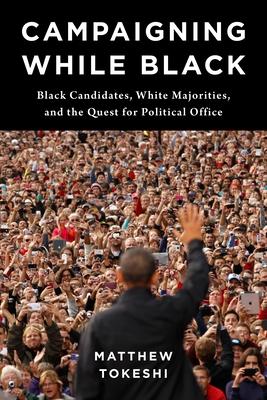Even today, Black politicians rarely hold the most powerful elected offices one step below the presidency: governor and U.S. senator. While about 11 percent of the electorate is Black, only 3 percent of senators and 2 percent of governors are Black. Only ten Black Americans have been elected to these offices since Reconstruction, and forty-two states have never elected a Black governor or U.S. senator. Why is it so rare for Black candidates to win elections for these offices?
Matthew Tokeshi examines the campaigns of every Black challenger for those offices from 2000 through 2020 and points to the significant effects of racial appeals to white voters. He demonstrates that Black candidates consistently face more attacks on stereotypically anti-Black themes such as crime, sexual misbehavior, and economic redistribution than comparable white candidates. Such attacks diminish their support among the large number of white voters with ambivalent or negative attitudes toward Blacks. However, despite this formidable hurdle, Black candidates can in some circumstances mitigate the effects of negative racial messages. Presenting timely new evidence on the racial dynamics that shape electoral politics in the United States, Campaigning While Black exposes the unique obstacles facing Black candidates and highlights ways that these barriers can be overcome.
Book
Campaigning While Black: Black Candidates, White Majorities, and the Quest for Political Office
(Write a Review)
Paperback
$38.89
Even today, Black politicians rarely hold the most powerful elected offices one step below the presidency: governor and U.S. senator. While about 11 percent of the electorate is Black, only 3 percent of senators and 2 percent of governors are Black. Only ten Black Americans have been elected to these offices since Reconstruction, and forty-two states have never elected a Black governor or U.S. senator. Why is it so rare for Black candidates to win elections for these offices?
Matthew Tokeshi examines the campaigns of every Black challenger for those offices from 2000 through 2020 and points to the significant effects of racial appeals to white voters. He demonstrates that Black candidates consistently face more attacks on stereotypically anti-Black themes such as crime, sexual misbehavior, and economic redistribution than comparable white candidates. Such attacks diminish their support among the large number of white voters with ambivalent or negative attitudes toward Blacks. However, despite this formidable hurdle, Black candidates can in some circumstances mitigate the effects of negative racial messages. Presenting timely new evidence on the racial dynamics that shape electoral politics in the United States, Campaigning While Black exposes the unique obstacles facing Black candidates and highlights ways that these barriers can be overcome.Paperback
$38.89